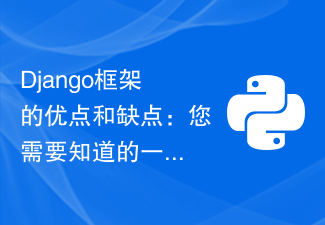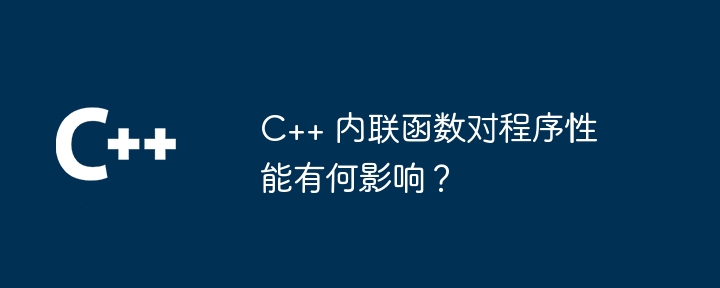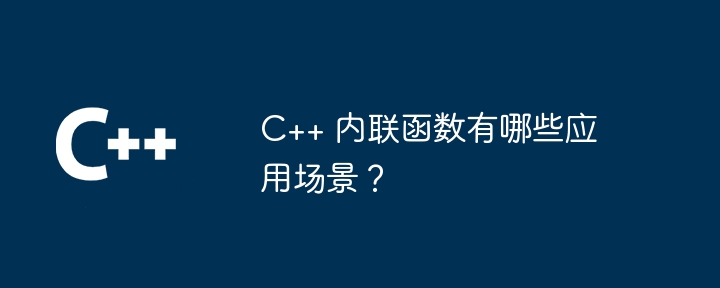 Backend Development
Backend Development C++
C++ Can a C++ function be declared inline? What are the advantages of inline functions?
Can a C++ function be declared inline? What are the advantages of inline functions?Inline functions are special functions that are embedded directly at the call site to improve efficiency, optimize code, and enhance readability. The steps are as follows: 1. Use the inline keyword to declare functions; 2. Eliminate the overhead of function calls; 3. Optimize compiler performance; 4. Improve readability; 5. Note: inlining is not always possible and may increase code size.

C Inline function:
1. What is an inline function?
An inline function is a special kind of function that is embedded directly into the place where it is called, rather than being executed through the normal mechanism of a function call. This can be achieved by using the inline keyword before the function declaration.
2. Advantages:
- # Improved efficiency: Eliminates the overhead of function calls, such as function pointer lookup and parameter passing.
- Code optimization: The compiler can optimize it according to the actual call situation, such as inline loops and branches.
- Code readability: Inline functions define the behavior of the function, which can reduce dependence on function calls, thus improving readability.
3. Practical case:
The following is an example of a small function that calculates the square of an integer:
inline int square(int x) {
return x * x;
}When calling this function When of. For example, recursive functions and other functions with complex control flow may not be inlined.
Inline functions increase code size and should be used with caution.
The above is the detailed content of Can a C++ function be declared inline? What are the advantages of inline functions?. For more information, please follow other related articles on the PHP Chinese website!
 了解Django、Flask和FastAPI框架的优缺点Sep 28, 2023 pm 01:19 PM
了解Django、Flask和FastAPI框架的优缺点Sep 28, 2023 pm 01:19 PM了解Django、Flask和FastAPI框架的优缺点,需要具体代码示例引言:在Web开发的领域中,选择合适的框架是至关重要的。Django、Flask和FastAPI是三个备受欢迎的PythonWeb框架,它们各自有其独特的优点和缺点。本文将深入探讨这三个框架的优缺点,并通过具体的代码示例来说明它们之间的区别。一、Django框架Django是一个全功
 Django框架的优点和缺点:您需要知道的一切Jan 19, 2024 am 09:09 AM
Django框架的优点和缺点:您需要知道的一切Jan 19, 2024 am 09:09 AMDjango是一个完整的开发框架,该框架涵盖了Web开发生命周期的各个方面。目前,这个框架是全球范围内最流行的Web框架之一。如果你打算使用Django来构建自己的Web应用程序,那么你需要了解Django框架的优点和缺点。以下是您需要知道的一切,包括具体代码示例。Django优点:1.快速开发-Djang可以快速开发Web应用程序。它提供了丰富的库和内
 推荐一款安卓浏览器——UC浏览器的优点及使用建议Jan 08, 2024 pm 04:49 PM
推荐一款安卓浏览器——UC浏览器的优点及使用建议Jan 08, 2024 pm 04:49 PM浏览器是一种大家经常使用的软件。除了手机自带的浏览器外,人们还会下载更好用、更适合自己的浏览器。在选择浏览器时,人们会比较它们的优点,看哪一款更好用。今天我来介绍一下UC浏览器有哪些优点,推荐一款适用于安卓系统的好用浏览器UC浏览器安卓版功能简介大多数用户选择使用UC浏览器,肯定是因为它具有独特的功能和优点。接下来,小编将为大家详细介绍一下作为一款浏览器,其最主要的功能是用于浏览网页拥有阅读模式,可以不受影响地阅读小说和文章3.UC浏览器内置网盘功能,可以将图片、视频等内容存储到云端4.安卓版u
 C++ 内联函数对程序性能有何影响?Apr 16, 2024 am 11:12 AM
C++ 内联函数对程序性能有何影响?Apr 16, 2024 am 11:12 AM内联函数通过将函数代码嵌入调用点提升程序性能,具有减少函数调用开销、提高局部性、优化循环等优点。但它也有缺点,如增加代码大小、编译时间变长、潜在的错误传播。实战中,内联较小函数可显著提升性能。使用指南包括仅内联体积较小的函数、注意循环内内联、考虑性能临界、谨慎检查错误传播。
 C++ 内联函数有哪些应用场景?Apr 16, 2024 am 11:30 AM
C++ 内联函数有哪些应用场景?Apr 16, 2024 am 11:30 AM内联函数是直接插入到调用代码中的C++函数,无需函数调用,提高性能。其应用场景包括:性能关键路径上的小型函数、频繁调用的函数、尾递归函数和模板函数。例如,在计算阶乘时内联函数可以消除函数调用开销,提高速度。
 java框架中代理模式的优缺点有哪些?Jun 03, 2024 am 09:34 AM
java框架中代理模式的优缺点有哪些?Jun 03, 2024 am 09:34 AM代理模式是一种Java框架设计模式,通过创建代理对象在客户端和目标对象之间进行中介。它的优势包括:保护目标对象,提供数据完整性和安全性;控制对目标的访问,实现权限控制和安全措施;增强目标行为,添加额外功能如日志记录、缓存和事务管理;简化测试,便于mocking和stubbing目标。然而,代理模式也存在劣势:开销:创建和维护代理对象可能降低性能;复杂性:需要深入理解设计模式;限制对目标的访问,可能在某些情况下不合适。
 golang 方法的优点是什么?Apr 25, 2024 pm 02:45 PM
golang 方法的优点是什么?Apr 25, 2024 pm 02:45 PMGo语言的方法提供多种优势,包括:促进代码重用和封装,使代码更模块化。提高代码简洁性和可读性,将数据和操作封装在一起。简化维护,修改方法不会影响使用它的其他代码。通过直接访问共享数据字段提供更好的效率和性能。实现面向对象设计原则,例如数据隐藏、封装和多态。
 miniled屏幕有什么优点Feb 18, 2024 am 10:09 AM
miniled屏幕有什么优点Feb 18, 2024 am 10:09 AM在很多小伙伴的印象中,2021年是miniLED屏的兴起时代,在2021年很多的厂商都发布和搭载了miniled智能屏幕,这么多厂商都在用的miniLED智能屏究竟有哪些优点呢,让我们一起来看一下。miniled屏幕有什么优点:答:有更高的峰值亮度。miniLED屏幕跟传统的屏幕相比,拥有了更长的屏幕寿命,不仅电用得少而且还特别亮。虽然说以前的屏幕也可以这么亮,但是屏幕比miniLED小了非常之多。miniLED屏幕拥有120hz的高刷新率的屏幕,让你在看视频刷热点的时候可以感觉到非常流畅。他还


Hot AI Tools

Undresser.AI Undress
AI-powered app for creating realistic nude photos

AI Clothes Remover
Online AI tool for removing clothes from photos.

Undress AI Tool
Undress images for free

Clothoff.io
AI clothes remover

AI Hentai Generator
Generate AI Hentai for free.

Hot Article

Hot Tools

DVWA
Damn Vulnerable Web App (DVWA) is a PHP/MySQL web application that is very vulnerable. Its main goals are to be an aid for security professionals to test their skills and tools in a legal environment, to help web developers better understand the process of securing web applications, and to help teachers/students teach/learn in a classroom environment Web application security. The goal of DVWA is to practice some of the most common web vulnerabilities through a simple and straightforward interface, with varying degrees of difficulty. Please note that this software

SublimeText3 Mac version
God-level code editing software (SublimeText3)

PhpStorm Mac version
The latest (2018.2.1) professional PHP integrated development tool

Safe Exam Browser
Safe Exam Browser is a secure browser environment for taking online exams securely. This software turns any computer into a secure workstation. It controls access to any utility and prevents students from using unauthorized resources.

Zend Studio 13.0.1
Powerful PHP integrated development environment





